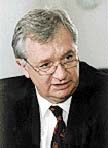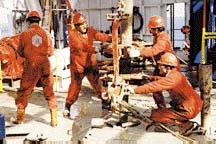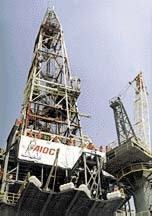|
Winter 1996 (4.4)  Two Years and
Moving Forward
December 12 marks AIOC's second birthday. I think it's auspicious that it's my father's birthday as well! These past two years have gone by so quickly. Accomplishments? Well, we've been trying to push forward simultaneously in four major areas. First of all, we were commissioned to "kick start" a very important project from a baseline position. As you know, AIOC is made up of 12 distinct companies representing eight different countries. Not only did we have to achieve rapid business alignment, but cultural consensus as well.
Right: The "Dada Gorgud," semi-submersible drilling rig. Secondly, we had to determine quickly whether or not we could actually deliver and work together with Azerbaijan in an "untested" Baku environment. In other words, could we synthesize two very diverse business paradigms between the Soviet heritage of Azerbaijan and the business practices of the West. We have been successful in this, as SOCAR (State Oil Company of Azerbaijan) and AIOC are now working extremely well together as a team. However, had there not been mutual respect, understanding, tolerance and cooperation, nothing would have been achieved. Thirdly, we have to create an export system to get Azerbaijan's oil to the international market. As you know, we're currently working on two alternate routes for the export of "early oil": one north through Russia to the port of Novorrosysk and the other through Georgia, both to the Black Sea. The first will be operational by January 1997; the second will be completed by the end of 1998. The successful negotiation of these Transport and Intergovernmental Agreements was the turning point for the whole project last year, and has been the trigger for the new business boom we are currently seeing in Baku. Finally, we have been continuously
positioning ourselves for the future with our main objective
in mind-the full field development of the Azeri, Chirag and deep-water
Gunashli (ACG) deposit. By mid-1997 we anticipate submitting
a completed Field Development Plan on behalf of our shareholders
to SOCAR and to the government of Azerbaijan. Let's go back to the "Soviet Paradigm" that you were referring to. What did you mean by that? Well, if you look back at global
history over the past 50 years, the world has been dominated
by two superpowers, the United States and the Soviet Union. Essentially,
global competition arose between two political and social philosophies
which were based on very different ways of thinking. The "Soviet
Paradigm" was centrally planned, which generally did not
allow much room for individual flexibility. Intellectually, we were fully aware that these two different paradigms could cause us considerable difficulties. In addition, we also faced significant language and cultural barriers. From the extended negotiation process between SOCAR and our shareholders, we recognized that we had two very different management styles. Not surprisingly, there was distrust between our two groups at the beginning. Nevertheless, we both knew that our final objective was the same, despite our different visions of how to accomplish it-that of achieving the early production and export of oil for Azerbaijan and our shareholders. But now two years later, I can say with all honesty that the two management teams of SOCAR and AIOC are working in tandem. There is great mutual respect between us, as well as understanding and trust. This is probably the most successful thing we've accomplished so far in Azerbaijan. It's the foundation upon which we can build the future together. How did you do it? Through hard work, through friendship, and through trying to put ourselves in the other person's shoes. Initially, I'd say we probably tried harder than they did, but now I think they try much harder than we do. Both groups have changed fundamentally over these past two years, but most of all, we now feel genuinely comfortable with each other. You know, there are so many things that can be open to misinterpretation and misunderstanding when you're working in cross-cultural situations. It's a continual educational process. That's why when two teams start talking to each other and demonstrating respect for each other, things begin to work. And when you party together, things start to happen. Azerbaijanis are fun-loving people, and Caucasian dancing is probably one of the best known ways to rid yourself of frustrations. So the way to produce oil in Azerbaijan is to party together! But you didn't start out that way, did you? No. I recall the first Steering Committee Meeting between SOCAR and our shareholders back in January 1995. It was both confrontational and difficult and resulted in misunderstanding. For example, to a Westerner a budget is an estimate of expenses to cover what you expect a project will cost. In the Soviet system, budgets were perceived as something fixed. If you either exceeded or undershot them, it was cause for blame. However, in the Western view, if your work is not well-defined at the beginning of a project, simply because it's impossible to know exactly what the final requirements will be, then you are expected under the circumstances to make your most intelligent estimate. In January 1995, international contractors coming to Azerbaijan could not assess their potential costs. Consequently, they cushioned their estimates to ensure that they did not suffer risk. So, there was a lot of misunderstanding between the partners on how we should go forward and what would be the cost. And the Steering Committee Meeting last week (October 9, 1996) with Azerbaijani officials, how did it go? The contrast between the two meetings after working together for two years was dramatic. There was total alignment and full understanding between the two management teams. The Chairman of the meeting, SOCAR's President Natig Aliyev, led the debate, and each foreign oil representative that was present commented on the professionalism of SOCAR and their government representatives. So times have changed. Our SOCAR friends have changed, and we've changed, too. There's no fundamental difference between the two teams, either socially, intellectually or professionally. Clearly, SOCAR has a very different set of management challenges than we do. But I admire what the SOCAR management achieves with the limited resources at their disposal. Although AIOC is SOCAR's main business priority right now, we are not the only company that they must deal with. There are other contracts and other service companies, plus many other distractions vying for SOCAR's attention. Somehow, they succeed despite all the difficulties. SOCAR has a small decision-making team? It's a very small team, but it delivers a very large volume of work. It's impressive. It's really impressive. So together you're developing a new business paradigm, a synthesis of the best of both Soviet and Western models? A synthesis is emerging, though at the same time, we're both maintaining our individuality. It's very simple. Unless we are fully aligned as two management teams and unless Azerbaijan succeeds, then no one will succeed. But if Azerbaijan does succeed, then we all win. We're all working together for the same common good. Azerbaijanis have a proverb: "Wish your neighbor two cows, so you can have one of them," meaning that if your neighbor is successful, you, too, will benefit. Then for Azerbaijan and its people, let me wish them four cows! What's happening with the pipeline route? You say the "northern route" will be operational by the end of this year? As you know, AIOC is already developing two export routes for "early oil." The "northern route" through Russia reverses a pipeline already in existence between Baku and the Black Sea port city of Novorossyisk. This route passes through Grozny and Tikhoretsk. The section through Azerbaijan will be operational by the end of this year for the transfer of Azerbaijan's oil, and SOCAR has already chosen the first oil to go north during the first quarter of 1997. Does the Chechnyan conflict impact the export of Azerbaijani oil? AIOC primarily has one responsibility, which is to transport Azerbaijani oil to the Russian border, at which point custody will be transferred to the Russian transport company, Transneft, which owns the transport systems for all of Russia. They will then deliver the equivalent amount of oil to Novorossyisk. Internal transfer of oil is the responsibility of Russia, and we have been fully reassured by Transneft that they will fulfill their obligations. They are a very good pipeline company. So if they run into difficulty around Grozny, they can utilize alternative supplies and routes? They can take Azerbaijani oil in whichever direction they wish, as long as Azerbaijan gets the equivalent delivered to a tanker at the Novorossyisk port. But I'm sure you've seen recent reports in the media of the positive developments that are happening in Grozny. I think it bodes well for the future. Is there a specific quality of oil that must be delivered to AIOC at Novorossyisk? No, simply the equivalent amount of crude. At this time, quality is not the issue between ourselves and Transneft. Does the same rule apply to Georgia in regard to AIOC's responsibility to guarantee the transport of oil only to the border? No. In this case, AIOC operates the pipeline from coast to coast between Azerbaijan and Georgia. We'll be transporting Azerbaijani oil and, perhaps, even third-party oil from other contracts in the Caspian, from Turkmenistan and from Kazakhstan. Under our pipeline lease agreement, AIOC and SOCAR will have the first priorities for export in this pipeline for the next 30 years. Clearly, we'll follow standard commercial arrangements. We're targeting to have this system operational in 1998. Why is the western route through Georgia slower in becoming operational? Because rehabilitation of this route is technically more complex than the northern route. We'll have to build a new terminal on the Georgian coast at Supsa. And between Tblisi (capital of Georgia) and the Georgian coast, the line is old and has been damaged. Also, new sections will have to be built between Akhstafa (Azerbaijan) and Tblisi to connect the two systems. How has the line been damaged? Since independence, Georgians have suffered immensely from economic hardships. Not only was the original line constructed some 20-30 years ago, but people have been making many illegal taps into it to obtain access to fuel for heating. We've already identified between 800-900 such taps. Simply put, individuals have been puncturing the line to create their own fuel supply. This is not surprising under the circumstances! Let's talk about Armenia, another of Azerbaijan's neighbors. Will they benefit from Azerbaijan's oil? That's a question you should be asking the politicians, not us. Clearly, we cannot be directly concerned with issues relating to Armenia. And although the Armenian-Azerbaijani conflict has truly been forgotten in the international community, for the Caucasus, it remains both a political and economical tragedy. Unless the issue of Nagorno-Karabakh can be settled fairly, perhaps of necessity to the disadvantage of both parties, then it will be very difficult for the region to evolve economically. Stability is critical. But in the meantime, the pipeline is being developed through Georgia, and all the infrastructure is being built up between Azerbaijan and Georgia? Yes, the geography of the Caucasus allows for Georgia and Azerbaijan to be intimate partners in this respect. There is a natural logistical corridor that links the Caspian to the Black Sea. In the short term, it has proved to be a crucial link for importing equipment and materials to support our project, as well as being the natural path for a pipeline to carry our first oil westwards. This route may or may not also become a viable option for the long-term major oil export that will inevitably follow. But at this point in time, to develop a pipeline through Armenia is simply not politically feasible. As U.S. Ambassador Kauzlarich has said, "Peace could bring a pipeline, but a pipeline won't bring peace." One of Turkey's key initiatives is to have the pipeline cross Turkey to its port of Jeyhan on the Mediterranean. A pipeline from Georgia through Turkey directly to the Mediterranean is clearly feasible from a technical point of view. What will determine whether or not it gets built will be broad, regional, commercial considerations. If such a pipeline would provide a better commercial option to investors than perhaps alternative bypass options to the Bosphorus, then it will be chosen. But in this context, the future of the Bosphorus is critical. Long-term northern export routes from Baku are being evaluated, and we are watching what develops with the Caspian Pipeline Company (CPC) in their business to the north. So, for any future long-term export solution, commercial realities will dictate the eventual outcome. This point was made to President Aliyev, but it was also acknowledged that political considerations could not be ignored. An effective balance between all these issues must be achieved. A lot of foreigners are starting to come to Azerbaijan. Any advice for newcomers? I think Baku is very different now than it was two years ago. The most obvious changes relate to social infrastructure such as in medical services, housing, hotels, supermarkets and restaurants. These days, there is access to all sorts of items and conveniences that didn't exist two years ago, which relieve a lot of the pressures of living in a foreign country. In addition, we all enjoy the richness of quality cultural events such as opera, ballet and all the other performing arts. Baku is quite unique in this respect. Do you often talk to other people who are developing projects in the former Soviet Union, and compare notes? That's a good question. Strangely enough, no. When one begins to work with AIOC in this special part of the world, one tends to forget that there are other projects out there, as our own is so "all-absorbing." We have to focus intensely in order to implement a very ambitiously paced timetable for ACG, and we must ensure that it works well. We do monitor developments in the CPC very carefully, however. I think the 4-hour presentation
that was given to the President last week (October 10, 1996)
shows the tremendous range of activity that is going on in AIOC.
This includes technical complexity, social complexity and the
logistical complexity of bringing the necessary materials from
all over the world. How large is your staff now? It includes some 120 expatriates and about 375 Azerbaijanis. There are also more than 1,000 Azerbaijanis working for us as AIOC subcontractors. Our organization began with five expatriates and 15 Azerbaijanis in January 1995. It's a remarkable achievement, and everyone, without exception, is to be commended for making it work. How many hours do you work each day? Too many. But that goes for everyone else on the project. The management team and our shareholders are seriously concerned about staff burnout. But the most important thing is for everyone to remain focused and to do what needs to be done. We're essentially here for one purpose-that's to have the "early oil" system operational next year. You've worked in a lot of places. How do you find Azerbaijan in relation to the other places you've worked? I've worked more than 30 years in the Far East, the Middle East, Europe and the United States, and I'd have to admit that the Azerbaijani community has the most highly educated and most culturally rich population that I've ever experienced. For Azerbaijanis, high standards of scientific education is clearly an inheritance of the Soviet system. You also see this reflected in their highly developed arts and culture. There seems to be an infinite supply of exceptionally qualified performing artists-musicians, vocalists, dancers, and actors-highly disproportionate to the size of its population. The same applies to education. Social position to a large extent reflects personal educational achievement. To gain social respect, you must be cultured and educated. The Academy of Sciences and the other senior institutes in Baku have developed a social order similar to what used to exist in Western Europe, but which has gradually disappeared. Here, an academician is a person of real influence and power. Such a system demands respect. The next issue of our magazine is dealing with youth. I know that AIOC has been hiring a lot of young people lately. What is your perception of them? Here, we catch a glimpse of the future. I see energetic, extremely well-educated young people. Most of the ones that we recruit are tri-lingual-proficient in Azeri, Russian and English. You see high levels of motivation, commitment and a real desire for Azerbaijan to succeed-both for themselves, for their families and for their country. You feel their optimism? Yes, we see very little pessimism among these young people, and as conditions improve, their enthusiasm increases. Major improvements in their economy will take time. But not once in two years have I ever heard an Azerbaijani complain about their current situation. I really admire these people, especially during these difficult times. For you, personally, presiding over AIOC has been a unique experience, hasn't it? Yes, it's very exciting during this new phase of oil industry development. Also, we have made many Azerbaijani friends and have met many interesting and important people. Access to heads of state is not normally a part of the everyday life of an oil company executive, but it is here. I've certainly learned a lot, and enjoyed it immensely. It's been challenging to work with AIOC and its 12 shareholders. I can think of no other project in the world that matches its complexity. But let me emphasize one thing: nothing happens without people, and the people of SOCAR and AIOC together are, in my opinion, delivering an exceptional program. From Azerbaijan International
(4.4) Winter 1996. AI Home | Magazine Choice | Topics | Store | Contact us |



